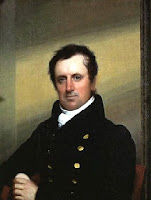
Towards evening we discerned the towers of a town in the visible horizon, and soon after came to the side of a sluggish stream of some size, lying low between banks that it sometimes evidently filled. The town was on the opposite side, walled, and not immediatly on the stream. The river was the Po, which we crossed by a bridge of boats, and, making a little circuit, we drove through a gateway and entered Piacenza. Ordering dinner, I walked out to look at the place, which contains more than 25,000 inhabitants. It is gloomy, crowded, and dull. Indeed, it is not easy to see how so many towns of this size are kept up on so small a surface. There does not appear to be any commerce worth mentioning; the manufacturers are usually on a small scale, and half the people seem idle. There is a small palace belonging to the sovereign, of tolerable architecture. It has fifteen windows in front, while that of the governor of the place has thirteen. I believe the White House has less than either of these; though Piacenza is merely a provincial town... This town and its walls are principally constructed of bricks: an unusual thing on the continent of Europe. The walls seem going to decay. In the evening I strolled into the great square, which I found thronged with people. These towns are so cramped within their fortifications, that walking, except in an area like this, or on the ramparts, is almost out of question; and as they all have a place d'armes, the people have acquired the habit of resorting thither for air and exercise. There was a silent, gloomy crowd in the square; and as many of the men wore cloaks and were smoking, it reminded me of Spain, a country whose habits may very well have been introduced through the princes. In speaking of the size of the palace, I ought to have mentioned that Piacenza was once a separate duchy; to which circumstance it probably owes that structure.

No comments:
Post a Comment